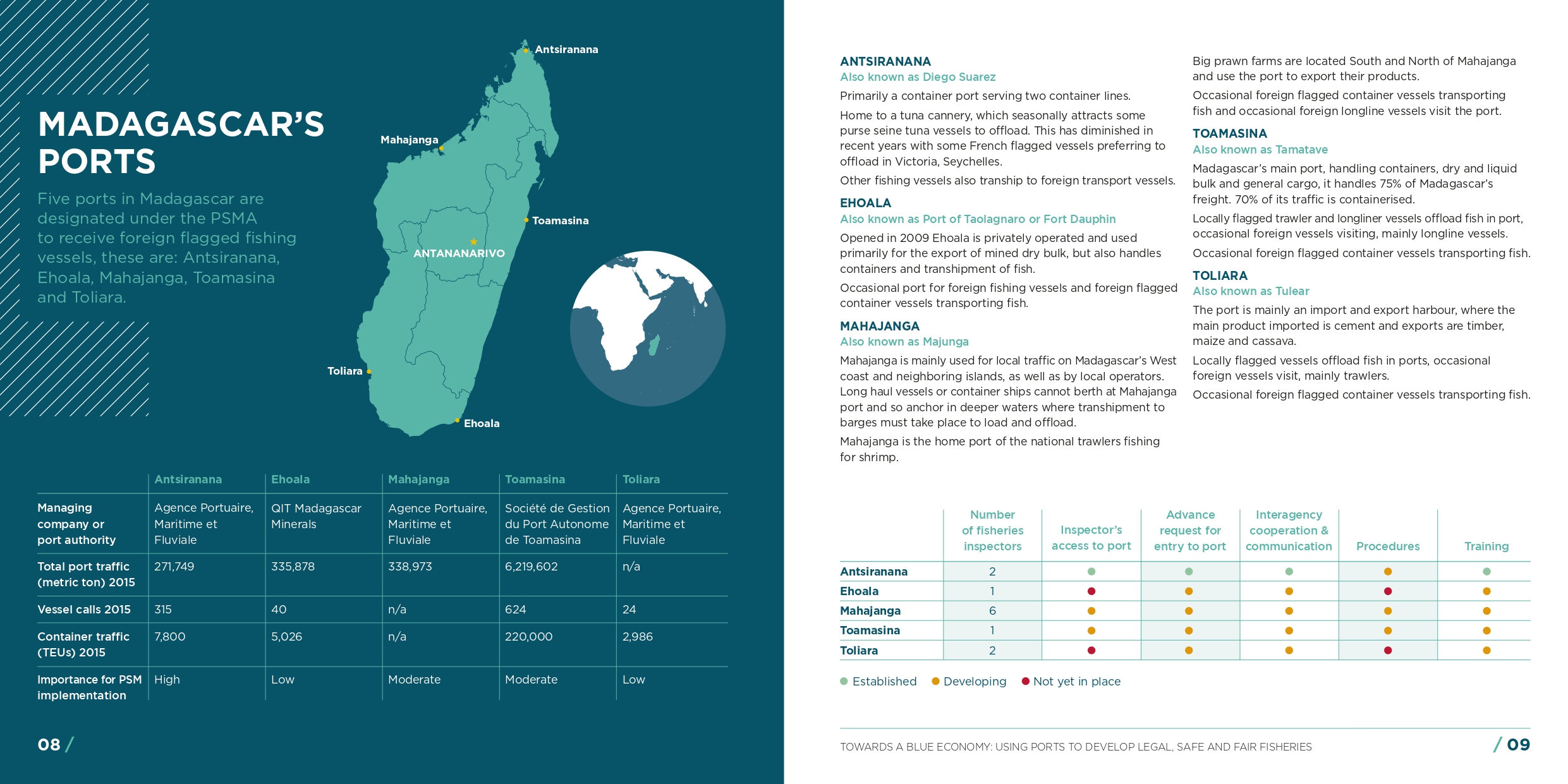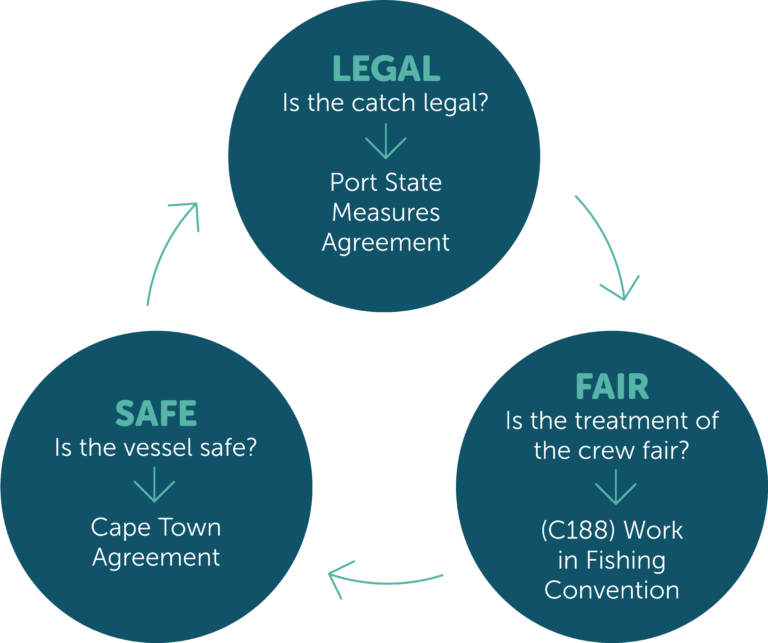Leaflet
Towards a Blue Economy: Using Ports to Develop Safe, Fair and Legal Fisheries
Annual global economic losses to illegal, unreported and unregulated (IUU) fishing are thought to be as high as $23.5 billion USD, while in the Southern African Development Community region the loss is conservatively estimated to represent $10 billion USD annually. The illegal operators involved in industrial IUU fishing are driven by money and their tactics are generally deliberate, organised and systematic. They break fisheries rules to reduce operational costs and to increase profits from the sale of fish and seafood.
Illegal operators also minimize their upfront costs and increase their profits by cutting costs involved with the safety of their vessels and the provision of fair and safe conditions for their crew. These might include the use of inadequate equipment or inappropriate modifications to the vessel, operating the vessels for extended periods without undergoing inspections or safety certifications, or forcing crew to work long hours with inadequate rest or food.
There is increasing international recognition that poor safety standards and substandard working conditions and are a hallmark of vessels that also engage in illegal fishing. This produces a range of related and associated crimes including document forgery, vessel identity fraud, tax evasion and modern-day slavery.
Therefore, stopping illegal fishing can contribute to the achievement of a range of development aspirations including the sustainable development goals, the growth of blue economies, and the furtherance of human rights.
GLOBAL ISSUES AND GLOBAL MARKETS REQUIRE GLOBAL RULES
Fishing is a global industry, dependent on a global regulatory system to operate efficiently and fairly. In addition the threats to fisheries and the forces and pressures driving change within fisheries are often from outside of fisheries requiring complex and multi-sector responses.
Fishing is a global industry, dependent on a global regulatory system to operate efficiently and fairly. In addition the threats to fisheries and the forces and pressures driving change within fisheries are often from outside of fisheries requiring complex and multi-sector responses.
Global pressures
- Increasing demand – an increasing human population is resulting in an increase in demand on for fish and seafood to feed growing populations and provide much needed protein at an ever-cheaper cost.
- Overcapacity – to make sure that domestic needs are met harmful subsidies are contributing to overcapacity in the sector and creating an unlevel playing field, with distant water fishing nations subsidising vessel building and fuel costs, allowing their fleets to travel further and catch more.
- Climate change – is impacting on traditional fishing grounds as stocks move in response to warming oceans, and people move in response to extreme weather and its impact on them.
Blue economy agendas
- The Southern African Development Community 2015 to 2063 Industrialisation Strategy and Roadmap identifies the importance of mainstreaming the blue economy concept for accelerated industrialisation.
- The African Union recognises the inherent challenges faced by its member States in realising the full benefits from the various sectors of the blue economy; notably, the menace of illegal fishing in the exclusive economic zones.
- Piracy and illegal drug trafficking are serious challenges in the ocean sector, posing a real threat not only to the safety of vessels and their crew but also to the economies of affected countries.
- Significant institutional and governance challenges constrain the ability of countries to effectively formulate and implement policies relating to growth of their blue economies.
THE POWER OF PORTS
Ports and port States play a unique role in the governance of the fisheries and maritime sectors. Port States are responsible under international law to control and monitor fishing vessels entering and using their ports and fish being moved through their ports. They have an opportunity to stop illegal fishing from going unpunished, and to identify unsafe vessels and unfair working conditions.
Activity at sea is difficult to monitor and oversee, making regulations and laws hard to enforce. Ports provide the most effective, low-cost opportunity to check, inspect and act against illegal operators. Port States control whom they allow to use their port for offloading, transhipment and for servicing of the vessel and crew. They provide a critical control point for foreign flagged vessels operating in or transiting national waters.
Denying port entry and access to port services, and consequently preventing illegal seafood from being landed and entering trade, increases the costs associated with illegal fishing operations and removes the financial incentives for engaging in these activities. Identifying illegal catches before or during landing is important as after they have been landed it becomes more difficult to detect illegalities that occurred during before or fishing.
Access to port to offload or tranship catch, take on fuel, crew and provisions or undergo repairs and maintenance is essential for fishing vessels. The denial of port access or services and the requirement for in-port inspection provides a powerful means of identifying illegal fishing activity and of disrupting the operations of illegal vessels.
We can use our ports as a powerful tool to:
- Refuse access to known or suspected IUU fishing vessels.
- Promote a legitimate and equitable environment for all fishers.
- Identify high-risk vessels for inspection or investigation.
- Work across agencies to identify, sanction and stop illegal operators.
- Establish systems and procedures that reduce the risk of corruption.
- Target repeat offenders who systematically fish illegally or operate unsafe vessels.
- Increase compliance in the industrial sector to support a sustainable artisanal sector.
- Improve governance and maritime security.
To do so, certain systems need to be in place. Requiring advanced requests for port access gives authorities time to gather information on a vessel and make an informed decision to grant or deny port access and services and whether to prioritise the vessel for an inspection. Once in port, inspections are important to identify an array of violations including illegal fishing, forgery and fraud, safety issues and forced labour.
MADAGASCAR’S PORTS
Five ports in Madagascar are designated to receive foreign flagged fishing vessels, these are: Antsiranana, Ehoala, Mahajanga, Toamasina and Toliara.

THREE TREATIES FOR PORT STATE CONTROL
The membership of the Food and Agriculture Organization (FAO), the International Maritime Organization (IMO) and the International Labor Organization (ILO) have developed a framework of international instruments to use ports to block illegally caught fish from being landed, to reduce the number of accidents and fatalities and to improve safety and working and living conditions in the fisheries sector.

The three treaties are the:
- FAO Agreement on Port State Measures (PSMA)
- IMO Cape Town Agreement (CTA)
- ILO Work in Fishing Convention No. 188 (C188)
The number of States ratifying and implementing these internationally binding instruments is increasing and the PSMA and ILO C188 are in force while the CTA is expected to enter into force shortly. To become truly effective tools, it is important that the minimum standards and requirements from these international instruments are adopted as widely as possible.
FAO, IMO and ILO jointly support the ratification and implementation of these instruments through for example, exchange of information for improving safety, working and living conditions and reducing IUU fishing. Technical and legal support and capacity building is available for States that ratify the international instruments to support implementation and enforcement.
WORKING TOGETHER TO DEVELOP LEGAL, SAFE AND FAIR FISHERIES
The benefits of harmonized implementation of the three international agreements, PSMA, CTA and C188 is an effective means of targeting illegal fishing as operators found violating safety or labour standards are likely violators of other laws and regulations and vice versa.
Growing an interagency approach with enhanced liaison between allied authorities will support harmonised implementation of the treaties and achievement of their objectives. It provides for more stringent and more effective port procedures and increases benefits for legal operators. By engaging with other agencies improved control of the fisheries sector will send a strong signal rejecting IUU fishing activity and promoting sustainable management.
Close cooperation between port authorities, maritime officials and fisheries inspectors is particularly important for exercising control over foreign flagged fishing and support vessels. In addition, cooperation with the marine police, safety, customs, immigration and labour authorities as well as the coastguard or navy are necessary at different stages of risk assessment, inspection and enforcement processes, required to implement port State measures.
Establishing working groups with communication channels for routine sharing of information and an alert system for notification when high-risk or illegal activity is identified are key. This also facilitates crosschecking and verification of information, sharing of resources and cooperation on risk assessment and cases of illegal fishing. Procedures and protocols for the exchange of information and coordination of activities among relevant authorities have proved to be very useful in supporting interagency cooperation.
Credits
Implementation of the Agreement on Port State Measures (PSMA) and complimentary international instruments and mechanisms in Madagascar is supported by Stop Illegal Fishing, with funding from the Deutsche Gesellschaft für Internationale Zusammenarbeit (GIZ) and The German Federal Ministry for Economic Cooperation and Development (BMZ). The impact of this work is anticipated to improve opportunities for blue growth and to contribute to the generation of food, nutrition and socio-economic development that will help end poverty and hunger in Madagascar and Africa.